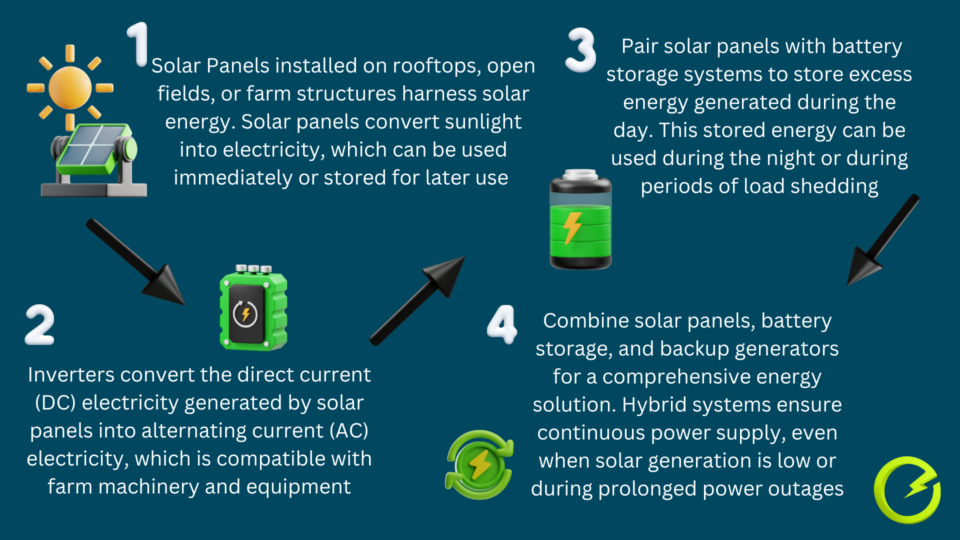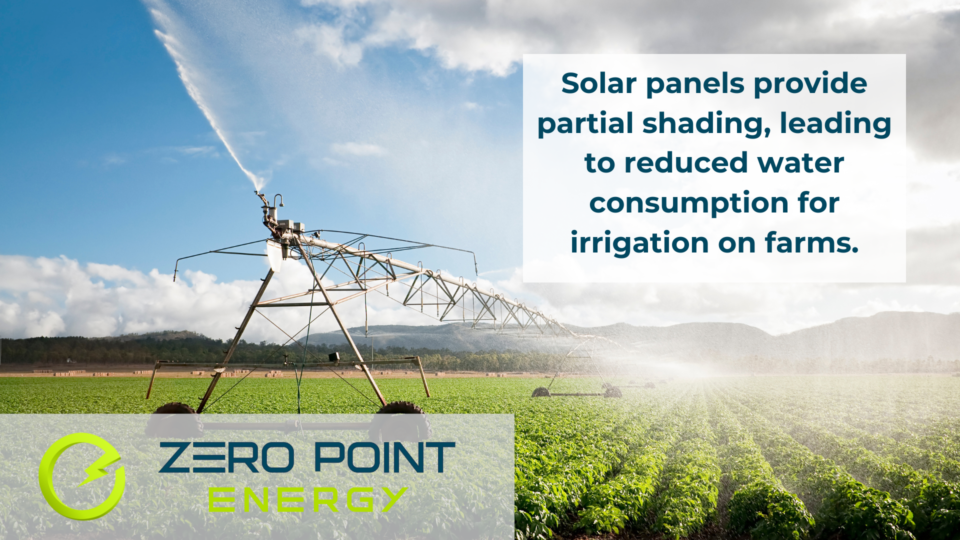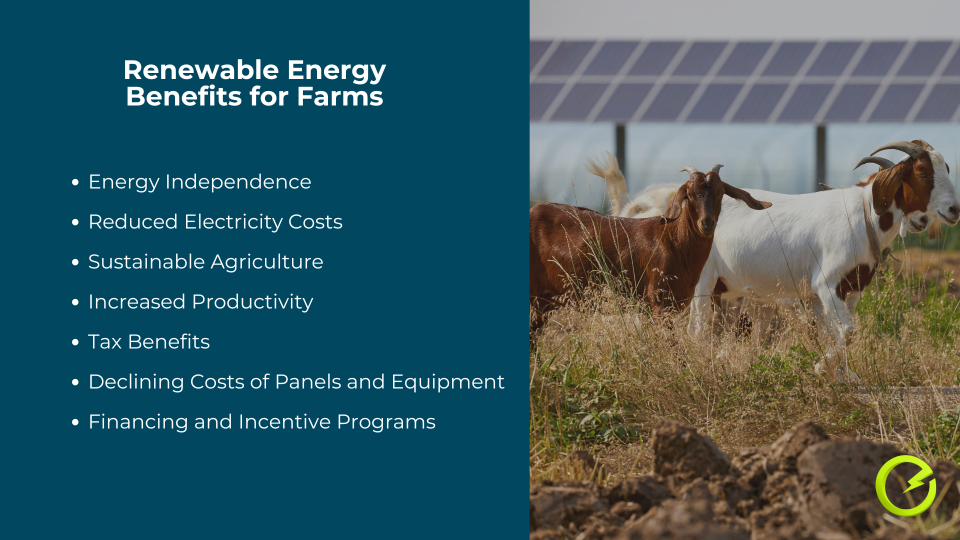
Transforming Farms in South Africa with Renewable Energy
In the face of South Africa’s frequent load shedding and escalating electricity costs, the agricultural sector is increasingly turning to renewable energy. Farms are particularly vulnerable to power interruptions, which can affect irrigation, refrigeration, and overall productivity. Renewable energy solutions offer a sustainable, cost-effective alternative that enhances energy security and supports farm operations. Farms can install a solar PV system on vacant unproductive sections of land, on warehouse building roofing; or through agrivoltaics. Agrivoltaics is defined as agriculture, such as crop production, livestock grazing, and pollinator habitat, located underneath solar panels and/or between rows of solar panels. Read our previous blog article on Agrivoltaics. Solar energy offers farmers the opportunity to harvest the sun twice; the same reason land is good for farming (flat, open areas), also makes it good for solar installations.
Renewable Energy Benefits for Farms
1. Energy Independence: With the right combination of solar, battery, and inverter systems, farms can achieve energy independence, freeing themselves from fluctuating energy prices and supply issues. Solar power systems and battery storage solutions provide consistent energy supply, ensuring that critical farm operations are not disrupted during load shedding.
2. Reducing Electricity Costs: By generating their own electricity, farms can significantly reduce their reliance on the national grid, leading to substantial savings on energy bills. As an example, Eskom offers a tariff scheme that farmers can benefit from whereby they are allowed “banking” of excess solar generated electricity into the grid during excess generation hours, and are credited at the end of the month thereby allowing them to benefit from unutilised solar in the month. Zero Point Energy is well adept at assisting farming customers to navigate the necessary administrative & technical requirements to make this work.
3. Sustainable Agriculture: Renewable energy sources, such as solar panels, have minimal environmental impact. Utilising these technologies helps farms reduce their carbon footprint and contribute to a more sustainable agricultural industry.
4. Increased Productivity: Reliable energy supply enables farms to operate machinery, maintain refrigeration systems, and power irrigation and borehole pumps without interruptions, leading to increased productivity and efficiency.
5. Tax Benefits: Accelerated Depreciation: South African farmers can take advantage of Section 12B of the Income Tax Act, which allows for accelerated depreciation of renewable energy assets. This means farmers can deduct 100% of the cost of solar photovoltaic (PV) systems, or other renewable energy equipment from their taxable income within the first year of installation. This reduces their tax liability and speeds up the return on investment. To get a better understanding of the tax incentives offered by SARS, read our blog article on the topic here.
VAT Reclaim: Farmers investing in renewable energy solutions can also benefit from reclaiming Value-Added Tax (VAT) on their renewable energy purchases. This further lowers the overall cost of implementing renewable energy projects, making it a more financially viable option.
6. Declining Costs of Panels and Equipment: The cost of solar panels and other renewable energy equipment has steadily decreased due to advancements in technology and increased production efficiencies. This trend has made renewable energy solutions more affordable for farms in South Africa, allowing them to invest in solar and battery systems at lower costs than before. As a result, farmers can achieve significant savings on energy costs and benefit from quicker returns on investment.
7. Financing and Incentive Programs: Various financing options, such as green loans and leasing agreements, are available to support the adoption of renewable energy solutions. Financial institutions such as Landbank are geared toward offering financial assistance towards agriculture and farming. Additionally, government grants and incentives can lower the upfront costs, making renewable energy installations more accessible and affordable for farms, even with limited capital. Read more about the government’s funding towards renewable energy solutions here.
Renewable Energy Solutions for Farms

Case Study: Successful Implementation on a South African Farm
A farm in the Western Cape, facing frequent load shedding and high electricity costs, installed a solar power system with battery storage. The farm now generates its own electricity, significantly reducing its reliance on the grid. The renewable energy system has not only lowered operational costs but also enhanced the farm’s productivity by ensuring uninterrupted power supply for irrigation and refrigeration. Read all about this early adopter of renewable energy solutions here.

Impact of solar panels on farmland and poultry
Soil Health: Solar panels are mostly made of silicon, a natural element that supports plant growth. Studies show no harmful leaching into the soil, even with alternative materials like cadmium telluride. Frames made of aluminium, a natural soil component, release minimal amounts into the earth, posing no significant risk.
Vegetation Under Solar Panels: Solar panels don’t overheat the soil. They create a more stable climate for crops, extending growing seasons. Research even shows some crops grow better under the shade of certain panels, using less water. Planting shade-resistant crops like saffron or native vegetation can enhance your farm’s biodiversity and attract pollinators.
Impact on Animals: Solar panels provide a shaded area for livestock, like the Parrys’ chickens, which can increase their outdoor time. However, precautions are necessary to prevent animals from damaging the system. Smaller animals like sheep are ideal for grazing near solar arrays, and raising the panels can allow them to maintain vegetation, reducing the need for mowing.
Overall, solar panels offer significant cost savings and can positively impact your farm’s environment.
Renewable energy solutions are transforming farms across South Africa, providing reliable, cost-effective, and sustainable energy alternatives. By investing in solar panels, battery storage, and hybrid systems, farms can overcome the challenges of load shedding and rising electricity costs, ensuring a stable and productive future. Zero Point Energy has vast experience working on solar power & battery storage projects for farming customers across South Africa. We’ve worked on over 30 farm sites by assessing, engineering or installing collectively over 10MW of solar power, battery storage and generator integration projects. Contact the team to discuss opportunities in this space.




